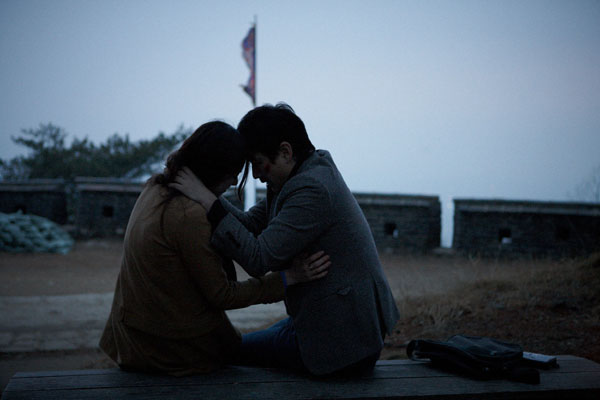In this week’s Chicago Reader, Ben Sachs wonders why the Chicago International Film Festival, whose 49th edition will run from October 10 through 24, has once again passed over a shot at screening a new film by Hong Sang-soo, particularly when they’d have two to choose from—the New York Film Festival, after all, will be screening both Nobody’s Daughter Haewon and Our Sunhi. Besides developing “a wise, witty filmic idiom of his own” and winning awards at festivals around the world, Hong, like Apichatpong Weerasethakul, “studied at the School of the Art Institute, which makes him an honorary Chicagoan. You’d think the city would be more eager to claim him as our own.”
Since it hasn’t, Sachs writes up a brief primer, beginning, naturally enough, with the superficial similarities between the features: “socially awkward interactions involving academics and/or filmmakers, often taken from Hong’s own experience; comically self-deluded protagonists; long scenes that transpire in single takes and with relatively little camera movement; lots of drinking; travel; precise, minimalist compositions; dream sequences; wry, observational humor concerning romantic and professional one-upmanship; and novelistic coincidences. It may sound like the director is simply repeating a formula, yet Hong has found innumerable ways to recombine these elements, using them to meditate on different themes from film to film.”
Sachs then goes on to draw an interesting parallel between Hong’s evolution as a filmmaker and Philip Roth’s progression as a novelist. As for Nobody’s Daughter Haewon, it “finds Hong working in a Bergmanesque vein, considering the interior life of a female acting student who once had an affair with one of her professors. It contains moments of pathos so deeply felt—and so recognizably complicated—that they cut through the ironic precision of the director’s imagery.”
Reviewing Haewon and Sunhi for Cinema Scope, Jordan Cronk notes that “both Oki’s Movie (2010) and In Another Country (2012) featured women in the lead role, though in both cases these characters worked more as catalysts for the greater deconstruction of the male sexual id than as true female portraiture. Furthermore, both those earlier films made a point to emphasize their structural ingenuity, a strategy which Haewon and Sunhi dispense with. Nevertheless, both establish internal patterns, recycle motifs (both visual and, surprisingly, auditory: each film features diegetic uses of music which work almost as theme songs), and feature a number of the same actors. If Hong does concern himself with one specific theme across these two films, it’s our collective pursuit of an earnest and engaged emotional understanding—or, as one character in Our Sunhi rather bluntly proclaims, ‘Sooner strangle an infant in his cradle than nurse un-acted love.'”
“Nobody’s Daughter Haewon is as fixated on themes of bewilderment and disconnection as any Hong film,” writes Jesse Cataldo in Slant, “but here there’s a bit more emphasis on death, which appears as both a lurking consequence and a reminder of the absurdity of these characters’ neurotic machinations. This means less irresponsible soju consumption and more quiet contemplation, with much of the action taking place in the historical ruins of Seoul’s Namhan Fortress. It’s here that Haewon’s on-and-off boyfriend, Seong-joon (Lee Sun-kyun), wonders about the vanished souls of the men who built the structure, finding in their complete erasure a parallel for his own wasted life. In this atmosphere of uncertainty and dread, a casually dropped aphorism like ‘death resolves all’ functions less as a bit of levity than a comforting realization, the antidote to a world where there’s so much to be resolved.”
“Always making clever use of seemingly fixed, recurring locations,” notes Carson Lund at In Review Online, “here Hong uses the idea of altitude as a structuring device; while much of the drama takes place at ground level, Haewon’s romantic turning points with Seongjun occur in the higher reaches of a public park above Seoul that becomes engulfed in fog by the film’s conclusion, applying to it a dreamlike dimension. One of the best one-off jokes in a film that otherwise strays towards the melancholy is the moment when this stormy weather is revealed right after one of Haewon’s acquaintances mentions what a beautiful day it is. In Hong’s films, communication is inherently silly—words rarely mean what they purport to mean, and only cascading layers of awkwardness can reveal the cores of people—so it’s only natural that there’s a similar slippage between what is witnessed/recorded and what is seen/desired/recalled.”
At Film.com, Calum Marsh turns to the dream sequences: “In the first, and most frivolous, she gives directions to French actress and singer Jane Birkin (playing herself), mother of Charlotte Gainsbourg, who compliments Haewon by telling her that she looks just like her daughter. Subsequent dreams betray a similar deference to waking-life surrogates, which Hong uses to work through many of the film’s thematic preoccupations in a manner that excuses (and undoes) the neatness of his resolutions. It’s a simple gimmick, but Hong derives much from it: the impact of the naturalistic drama is heightened by these brief forays into the realm of fantasy, which subtly shift the focus from emotional catharsis to the process of attaining it.”
Sean Gilman suggests that, in the recent films, “the self-delusions of Hong’s heroes have taken a metaphysical turn: not only are they not honest with themselves and each other in their romantic lives, but the very nature of their world has become unstable, liable to be rearranged or erased with the stroke of a pen or a sharp cut in the film. Where the earlier films (and also Hahaha) were built around coincidence and repetition, the later films have become Duck Amuck with horny, drunken film school denizens.”
Last month, we pointed to a marvelous piece by Boris Nelepo in the Notebook. More for now from Howard Feinstein (Filmmaker) and Jose Solís (Film Experience). Nobody’s Daughter Haewon premiered in Berlin and screens Sunday and Monday at the NYFF.
Update, 9/28: Peter Labuza and Carson Lund discuss Haewon in the latest Cinephiliacs podcast.
Updates, 9/30: “I often find myself endorsing Hong’s films with the following caveat,” writes Calum Marsh at the top of his primer, posted at Film.com: “reserve judgement until you have seen at least three. This seems to me the only reasonable way of deciding whether his particular sensibilities work for a given viewer, who may or may not grow accustomed to his work’s rhythms but in any case needs ample time to find out. It may be that Hong Sang-soo, more than just about any filmmaker I can think of, makes films which function best collectively, each engaged in conversation with the others and each new one subtly shifting our conception of them all.”
At Reverse Shot, Leo Goldsmith suggests that Hong’s career “is maybe just an elaborate send-up of the very concept of auteurism.” In Haewon, he spots “the ineluctable pull of Hong’s narrative mechanics at work: once locked into the pattern of meeting and talking, always in the same parks, the same cafes, the same bookshops, there is no escape—at least not until someone is properly humiliated, or dissolves into a puddle of pitiable emotion.” And a “sense of inevitability—at its most mundane, and not in the more epic sense of fate or destiny—is what seems to drive Hong’s films forward (if in fact that’s where you’re going), and I suppose your enjoyment of the film rests on whether you find that enervating or, like Hong, utterly hilarious.”
Updates, 10/14: With Haewon opening in the UK, Little White Lies‘ David Jenkins has put together a “Bluffer’s Guide To Hong Sang-Soo.” And the British critics are embracing the film: Nigel Andrews (Financial Times, 4/5), Peter Bradshaw (Guardian, 3/5), Trevor Johnston (Time Out London, 3/5), and Mark Kermode (Observer, 4/5).
And Vadim Rizov has sent a review over to LWL from the States: “Haewon worries about whether she’s a ‘good person’ (a perpetually unrealized aspirational designation for Hong’s men) while trying to make a decision about whether to end her relationship with Lee. The usual fretting over the inability to construct a functioning ethical system applicable in real life is underlain with a strong morbidity…. Her triumph is in finally defining autonomous life in Korea on her own terms; a shame she has to share her climax with yet another one of the ‘Korean men’ foot-stampingly decried in In Another Country.”
Update, 11/16: “Employing highly literary style, Hong Sang-soo refrains from overt social critique,” writes Ela Bittencourt for frieze. “There are, however, hints of unease. Haewon, who lived abroad as a child, is referred to by her friends as a ‘mixed-breed’ and ‘aristocratic,’ and her directness is deemed unsuitable to South Korea…. The film plays delicately on the idea that our feeling of timelessness, a deep connection to the past and to heritage, is at odds with our acute sense of mortality—our personal histories infinitely short compared to the cities that we inhabit.”
Update, 11/20: In Bright Lights, John A. Riley notes that “for a film set in spring, Nobody’s Daughter Haewon has all of the autumnal charm of one of Otar Iosseliani’s world-weary fables; and of course, the national beverage of each director’s country seems to become a character in his films. There’s also the distinctly Korean sensibility of reserve, detachment and insinuating humor. For example, later on in the film, director Haewon meets another film director, this time with a desire to marry someone ‘just like her.’ The director’s brief telephone exchange, apparently with Martin Scorsese, seems like a satirical reflection on 2013, the year when famous contemporary Korean directors like Bong Joon-ho and Park Chan-wook found success in Hollywood.”
NYFF 2013 Index. For news and tips throughout the day every day, follow @KeyframeDaily on Twitter and/or the RSS feed. Get Keyframe Daily in your inbox by signing in at fandor.com/daily.





